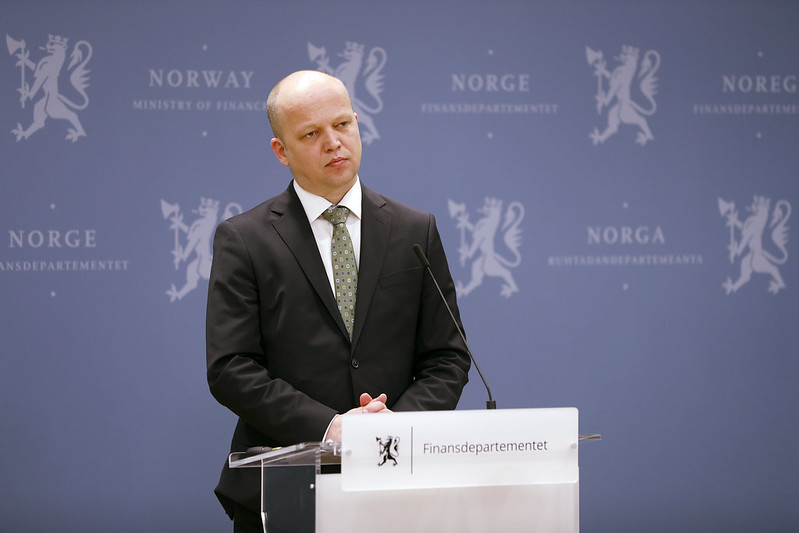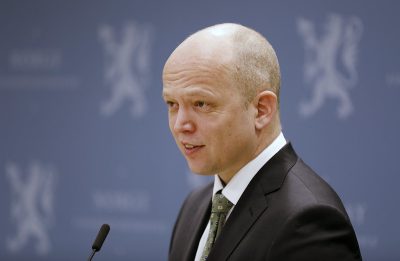Norwegian Finance Minister Trygve Slagsvold Vedum and his ministry colleagues need to rewrite much of their state budget for 2023, because they underestimated inflation and expected stronger economic growth. They’ll also need to withdraw more money from the Oil Fund (instead of the politically desired less) to balance their revised budget and keep it from being even tighter than intended.

Political commentators were already warning early last week that “Vedum’s mistakes” would have consequences. The main problem was that he didn’t think prices would rise more than 2.8 percent this year, even though both Norway’s central bank and state statistics bureau SSB (Statistics Norway) were already predicting 4.5- and 3.5 percent respectively when Vedum first presented the government’s budget last October.
Since then Norges Bank has further raised its prognosis for Norway’s Consumer Price Index (CPI) to 4.8 percent, and SSB has boosted its own to 4.9 percent. Vedum’s state budget is therefore already outdated, and needs major revisions.
He and his ministry acknowledged their blunder in an announcement released just before the weekend, classic timing for executives or politicians who want to downplay bad or embarrassing news. The ministry claimed that “updated” outlooks for wage- and price growth this year “are higher than what was expected last autumn. If they’re not adjusted, the budget this year will become considerably tighter than intended.”
Vedum tried to put a positive spin on the embarrassing announcement, but noted how the “changes” in wage- and price growth would affect everyone from police officers on the job to the amount of money parents receive for child support. “We’re going to do something about that,” Vedum promised, without specifying how his own ministry’s miscalculations are to blame.
There’s no question the government wanted to withdraw less from the Oil Fund (Norway’s huge sovereign wealth fund meant to save oil revenues for future generations) to balance its budget. Vedum, from the small Center Party, and Prime Minister Jonas Gahr Støre from the Labour Party, also boosted taxes and wanted to cut spending, leaving their fellow government ministers to blame budget cuts on the need for a tighter state budget.
With inflation currently at nearly 6 percent, though, prices are spiking for the government as much as they have for private consumers. That would force hospitals, schools, police and all public services to make even more drastic cuts than initially expected, at a time when politicians’ priorities are already hotly contested.
Finance Minister Vedum has thus been forced to dip into the Oil Fund after all, in order to “adjust” the amount of money various public entities actually receive. “When price- and pay growth are so much higher than expected, there’s a need to adjust the level of funding in 2023,” wrote the ministry in its press release that was not immediately available in English. “If we don’t do that, activity at hospitals, the police, schools and other important services be lower than what the budget allowed.”

A revised state budget is always expected and proposed in May, but commentator Terje Erikstad in newspaper Dagens Næringsliv (DN) wrote that this year’s revisions will be unprecedented. He noted that prognosis makers often err in their speculation, “but this huge underestimation of both price- and pay growth by the finance ministry looks simply amateurish.”
It also follows what most view as a messy proposal for a controversial new tax on salmon farming that remains highly unclear. Fisheries Minister Bjørnar Skjæran of the Labour Party and especially Member of Parliament Geir Pollestad of Vedum’s Center Party haven’t helped by issuing statements that have sent salmon producers’ share prices both up and down. Both Skjæran and Pollestad have, unwittingly or not, speculated publicly that the actual tax may be lower than initially proposed.
“That’s totally irresponsible and can in fact be illegal, to pass on what could be insider information,” Erikstad wrote. “The government has created enough trouble for itself without damaging a well-thought-out tax with poor craftmanship. Central politicians who don’t understand that they should keep quiet until a final tax proposal is put forth are incredibly amateurish.”
Commentator Kjell Werner at newspaper Dagsavisen was also critical, but mostly over the miscalculation in price hikes. “Politicians must do what they can to control the dramatic increase in prices,” he wrote, just before Vedum announced he’d decided to add more money to the budget after all. Werner notes that Vedum must have known that his budgeted wage- and price hikes were too low: “The government didn’t adapt its map to the terrain,” he wrote. “With open eyes, the politicians adopted a budget based on prices that would only rise by 2.8 percent.”
Prime Minister Støre, already in trouble with voters as is Vedum, admitted that the government will need major revisions in May. More billions will be needed, especially at a time when his government is moving forward with plans to spend NOK 19.7 billion on new tanks that Defense Chief Eirik Kristoffersen doesn’t want. Billions more are heading for Ukraine, to boost their battle against Russia’s invasion and preserve democracy.
It also suggests that a hotly debated financial crisis at Norwegian hospitals and nursing homes may be less painful than expected. More money will now be earmarked for health care, defense and local governments.
“It’s good that they admitted their budget was based on wrong numbers,” newspaper Dagsavisen editorialized over the weekend. “Now the public sector can breathe a sigh of relief and activity levels can be maintained. There is reason, however, to worry over how the government handled this … it’s also hard to understand why this government can’t communicate better.”
newsinenglish.no/Nina Berglund

